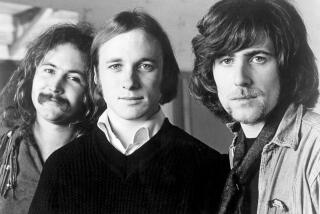The 45-Year Hit Machine
Spend a few moments scanning a list of Irving Berlinâs most popular songs, and three things become quickly apparent: the sheer volume of his output, the magnitude of those hits and the unparalleled longevity of his career.
Of Berlinâs âHot 100â hits, 25 reached No. 1 on the weekly pop charts, according to âJoel Whitburnâs Pop Memories 1890-1954.â And three of those songs rank among the longest-running No. 1 hits in pop history. Bing Crosbyâs recording of âWhite Christmasâ topped the chart for 14 weeks in the 1940s, Fred Astaireâs âCheek to Cheekâ was No. 1 for 11 weeks in 1935, and Arthur Collins and Byron Harlanâs âAlexanderâs Ragtime Bandâ was on top for 10 weeks in 1911.
Incredibly, Berlin turned out Top 5 hits for more than 45 years. He landed his first Top 5 tune in 1909 with âMy Wifeâs Gone to the Country (Hurrah! Hurrah!),â and his last in 1954 with âCount Your Blessings (Instead of Sheep),â an Oscar-nominated song from the movie âWhite Christmas.â
And Berlinâs old songs are still revived periodically. âPuttinâ on the Ritzâ was a Top 5 smash for a Dutch singer named Taco in 1983, more than 50 years after it was introduced by Harry Richman in the 1930 film of the same name.
Cover versions of Berlin classics have appeared on two multi-platinum albums in the past decade. Linda Ronstadt included âWhatâll I Doâ on her smash 1983 album âWhatâs New,â and Willie Nelson featured âBlue Skiesâ on his 1978 LP âStardust.â
ASCAP (the American Society of Composers, Authors & Publishers) included two Berlin classics--âWhite Christmasâ and âThereâs No Business Like Show Businessâ--in its latest recap of the most performed âstandardsâ in its repertoire over the past decade.
All of Berlinâs hits were released prior to the inception in 1958 of the Grammy Awards. But two of them have been inducted into the Grammy Hall of Fame, which was inaugurated in 1974 to honor pre-1958 recordings. Crosbyâs âWhite Christmasâ was one of the original five inductees; Kate Smithâs âGod Bless Americaâ was added in 1982.
âWhite Christmasâ is easily Berlinâs all-time biggest hit. In fact, Crosbyâs recording of the song on Decca is generally acknowledged as the best-selling single in pop history, with worldwide sales estimated at 30 million.
âWhite Christmasâ was introduced in the 1942 movie âHoliday Inn,â and brought Berlin his only Academy Award. Crosbyâs bittersweet recording of the song was No. 1 for 11 weeks that year, and returned to No. 1 in 1945 and 1946. This evergreen is one of the most frequently recorded songs in pop history, as are three other Berlin classics: âBlue Skies,â âAlwaysâ and âAlexanderâs Ragtime Band.â
Berlin wrote âGod Bless Americaâ for the 1918 soldier revue âYip, Yip, Yaphank,â but deleted it from the show and shelved it until 1938, when he gave it to Kate Smith. Her stirring version of the song cracked the Top 10 in 1939, and was a hit twice more in the early â40s.
In addition to his dozens of hits as a songwriter, Berlin recorded one hit as an artist. In 1910, at the age of 22, he cracked the Top 10 with the novelty song, âOh, How That German Could Love.â
Many of Berlinâs most successful songs originated in popular movies. âCheek to Cheekâ was one of five Top 10 hits to emerge from the Astaire and Ginger Rogers classic, âTop Hat.â Astaireâs recording of the Oscar-nominated song was the biggest hit of the â30s.
In 1968, Berlin received a Grammy Lifetime Achievement Award from the National Academy of Recording Arts & Sciences. The award cited âhis more than a half century of composing songs so seemingly simple and yet filled with so much warmth and musicality and love.â
More to Read
The biggest entertainment stories
Get our big stories about Hollywood, film, television, music, arts, culture and more right in your inbox as soon as they publish.
You may occasionally receive promotional content from the Los Angeles Times.










